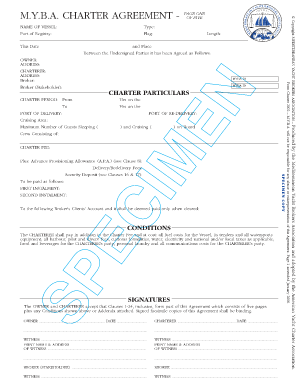The MYBA Charter Agreement is a comprehensive contract used for superyacht charters, developed over three decades ago by professionals in the yachting industry. It was created to provide clarity on all charter-related terms and to safeguard the rights of both the yacht owner and the charter guest. Since its inception, the agreement has been regularly updated to reflect changes in the industry and to address potential issues before they arise. Today, it’s regarded as the leading standard for yacht charter contracts worldwide.
According to Emmanuel Pertuisot, President at Windward Yachts, the contract is designed to fairly represent the interests of both key parties involved. It serves as a strong reference point when unexpected scenarios occur, and we’re consistently thankful to have such a reliable framework in place.
While the document spans eight pages, Senior Charter Broker Lisa Salleron emphasizes its importance. “Yacht charters involve unique considerations that don’t typically apply to land-based holidays,” she explains. “Our responsibility is to make sure everything is clear and agreed upon ahead of time”.
What to Know Before Signing a Charter Contract
Charter brokers strongly encourage clients—especially first-time charterers—to take the time to review the agreement carefully. While brokers will have already walked clients through the essential terms, some parts of the contract often benefit from extra explanation or a closer look.

One common point of confusion is the initial deposit. Typically, 50% of the total charter fee is required upfront at the time of signing. Understandably, some clients question why such a large amount is needed so far in advance, particularly if the charter is a year away. In certain cases, however, brokers can arrange a staggered payment plan, especially for early bookings.
Another key element outlined in the agreement is the Advanced Provisioning Allowance (APA), which covers onboard expenses like fuel, food, and docking fees. It’s a term that comes up often, and brokers make a point to clarify what’s included in the base charter fee versus what falls under the APA. After the trip, the broker will review the APA accounts to ensure everything adds up, and clients are entitled to request an update on the APA balance at any time during their charter.
Key Considerations in the MYBA Charter Agreement
One of the core principles outlined in the MYBA Charter Agreement is that the captain holds full authority onboard throughout the duration of the charter. This isn’t just a formality—it’s essential for safety and legal compliance. A common scenario where this becomes especially relevant is with the use of water toys, such as jet skis.
Because yachts are officially classified as commercial vessels, they’re also bound by international maritime standards, including crew work and rest requirements. “It’s crucial that guests understand the captain’s responsibility to ensure all activities align with both local laws and international maritime rules,” she adds.
In response to the industry’s growing complexity, the most recent version of the MYBA Agreement expanded its Special Conditions section. This now includes provisions related to anti-money laundering (AML) policies and Know Your Client (KYC) procedures. Beyond legal requirements, the section also offers a space to outline more personal requests from the charterer or the owner. Clients with dietary needs or specific preferences, for instance, can have those detailed here.
However, clearly defining these expectations requires transparent communication early on. If something is essential to the charter experience—whether it’s food, itinerary, or cabin arrangements—it should be raised from the beginning. Your broker will assess whether it’s something that needs to be documented in the special conditions. That’s how we ensure a tailored and smooth experience.
Of course, no contract can control external factors like the weather or guarantee specific moorings at popular ports. A good broker will always emphasize the importance of staying flexible during the trip, as itineraries might need to shift in response to changing conditions.
Finally, if something doesn’t align with what was agreed in the contract, the best course of action is to speak up while still on board. Captains and crew are usually very receptive to feedback. Raising concerns during the charter gives everyone a chance to resolve them. Unfortunately, complaints made after disembarkation often cannot be addressed.
Avoiding Disputes and Ensuring a Smooth Charter Experience
Chartering a yacht is a significant financial commitment, so it’s only natural that clients want their experience to be seamless and free of conflict. While disputes do occasionally arise, the MYBA Charter Agreement has proven to be a reliable tool for resolving them. In most cases we’ve witnessed, the resolution simply reflects what was already outlined in the contract—after a lot of time and unnecessary legal costs.
To prevent issues from reaching that point, one of the most important steps a client can take is selecting the right charter broker. A knowledgeable broker who can clearly communicate terms and provide accurate advice is key—it can truly define whether the charter is a success or not.




